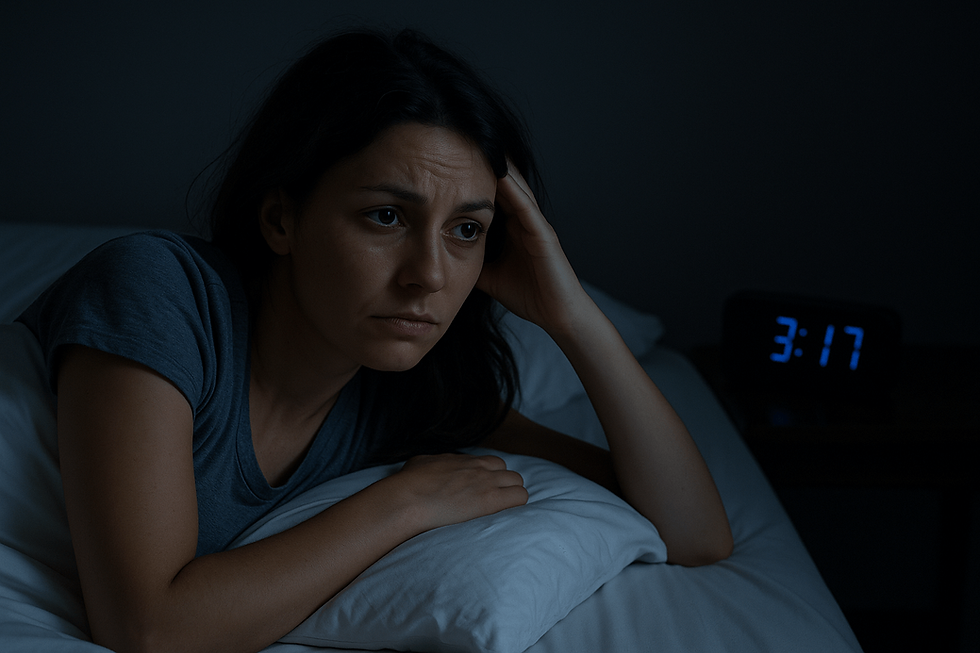Insomnia: What It Is, Why It Happens, and How to Sleep Better Naturally
- Jun 18, 2025
- 4 min read

If you're lying awake again, hours after you meant to be asleep, you're not alone.Insomnia is one of the most common sleep issues in the world — and one of the most misunderstood. It’s more than just a rough night here or there. For many, it’s a frustrating pattern of disrupted sleep that can affect mental, physical, and emotional well-being.
This guide covers what insomnia really is, what causes it, and what you can do to start turning things around — naturally.
What Is Insomnia?
Insomnia is a condition where falling asleep, staying asleep, or waking up feeling rested becomes a consistent challenge — even when you’ve given yourself the time and space to sleep.
There are two main types:
Acute insomnia: Short-term and typically triggered by stress, schedule changes, or life events. It usually resolves on its own.
Chronic insomnia: Longer-term, happening at least three times a week for three months or more. This type often requires more structured intervention.
Insomnia affects not just how long you sleep — but how restorative that sleep is.
What Causes Insomnia?
There’s no single cause behind insomnia. In most cases, it's a combination of internal and external factors:
🧠 Psychological Factors
Stress, anxiety, overthinking, and depression can all activate the brain’s alert systems when you're trying to wind down.
🩺 Medical Conditions
Chronic pain, hormonal changes, acid reflux, neurological disorders, or sleep apnea can lead to repeated awakenings or restlessness.
💊 Substances and Medications
Caffeine, nicotine, certain prescriptions (like antidepressants or corticosteroids), and even alcohol can interfere with sleep depth and timing.
📱 Technology and Light Exposure
Exposure to blue light from screens in the evening delays melatonin production, keeping the brain in “daytime” mode well into the night.
🛏 Environmental and Habitual Factors
Noise, light, an uncomfortable bed, inconsistent sleep times, or using the bed for work or TV can all confuse your body’s natural rhythm.
Signs You Might Be Experiencing Insomnia
Insomnia doesn’t always look the same for everyone, but common signs include:
Lying awake for 30+ minutes without falling asleep
Waking up multiple times and struggling to fall back asleep
Waking earlier than desired and unable to return to sleep
Feeling unrefreshed or foggy in the morning
Relying on caffeine to stay alert during the day
Irritability, anxiety, or lack of focus
If these symptoms occur several times a week and affect your daily life, it may be chronic insomnia.
Why Chronic Sleep Loss Matters
Occasional poor sleep is manageable. Chronic insomnia, however, can lead to more serious consequences:
Increased risk of depression and anxiety
Weakened immune system
Poor cognitive performance and memory
Higher risk of heart disease and hypertension
Blood sugar regulation issues
Hormonal imbalances
Sleep is not just rest — it’s a biological process essential to healing, regulating mood, processing emotions, and maintaining physical health.
Natural Strategies to Improve Sleep Without Medication
Before considering medications, many people successfully reduce or resolve insomnia through lifestyle and behavioral changes. These small shifts can have a big impact:
1. Keep a Consistent Schedule
Wake up and go to bed at the same time every day — even on weekends. This trains your circadian rhythm and improves sleep efficiency.
2. Limit Screen Exposure at Night
Turn off screens 60–90 minutes before bed. If that's not possible, use blue light filters or night mode on your devices.
3. Create a Wind-Down Routine
Develop habits that calm your mind and signal sleep is coming: dim lights, stretch, read a paper book, or listen to calming music.
4. Control Your Sleep Environment
Aim for a cool, dark, and quiet bedroom. Consider blackout curtains, earplugs, or a white noise machine if necessary.
5. Watch What and When You Eat and Drink
Avoid caffeine after early afternoon, limit alcohol, and skip heavy meals within two hours of bedtime.
6. Use the Bed Only for Sleep
This helps your brain associate the bed with rest. If you can't sleep after 20–30 minutes, get up and do something relaxing in low light before trying again.
7. Try Breathing or Relaxation Techniques
Simple practices like deep breathing, progressive muscle relaxation, or guided meditation can help your nervous system shift into sleep mode.
When to Consider Professional Help
If insomnia lasts longer than a few weeks or begins interfering with your functioning, it may be time to seek help.
Cognitive Behavioral Therapy for Insomnia (CBT-I) is the most effective non-drug treatment available. It addresses the thoughts, habits, and behaviors that interfere with sleep and is widely recommended by sleep specialists and clinicians.
Other professionals who may be able to help include sleep medicine doctors, therapists, or licensed counselors.
Final Thoughts
Insomnia is real, frustrating, and often invisible to those around you — but it's not something you have to accept as normal.Sleep is a foundation for everything else: your mood, your health, your energy, your focus. Improving it may take time, but change is possible — and every step toward better sleep is a step toward better overall well-being.
Whether your insomnia is recent or long-standing, you’re not alone — and you’re not stuck.



Comments